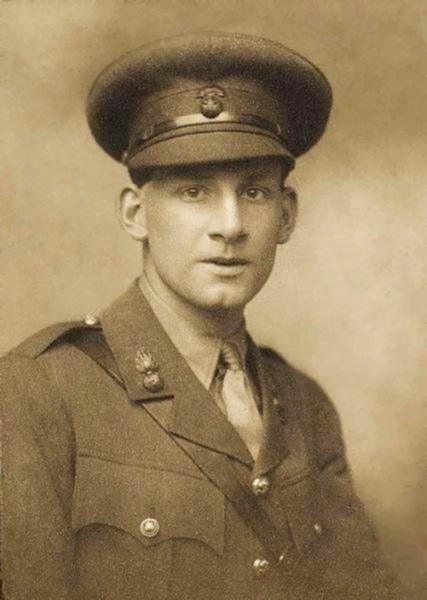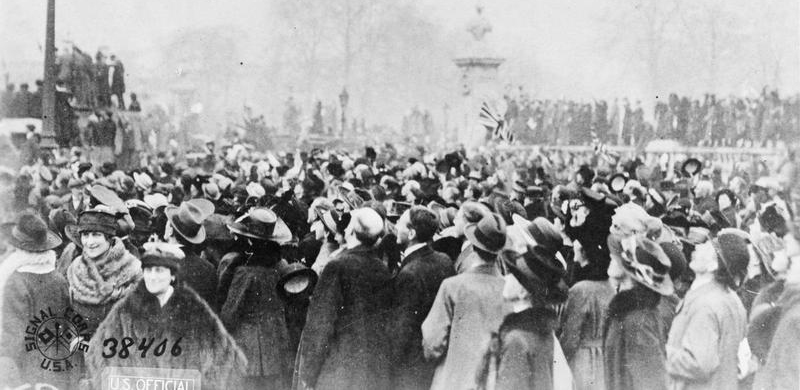At 11am on Monday 11 November 1918 the First World War officially came to an end. Many British soldiers on the Western Front were elated when they heard the news. In a letter penned that morning, Sergeant Arthur Vigurs wrote to his fiancé Olive that ‘It’s a glorious ending to the war, anyway, and everyone must be extremely glad we are on the winning side’.[1]
In London, revellers flooded the streets and festivities ensued. Despite the unpleasant autumnal weather, The Times reported that ‘nightfall brought no end to the jubilation…The unceasing drizzle was powerless to depress the high spirits of the people… All through the evening crowds that could not be numbered surged through the streets’.[2]
There were similar scenes across the United Kingdom. In Manchester, ‘The infectious gaiety spread from streets into shops’, and the ‘the bugle bands and the processions went on in the main streets until far into the night’.[3] In Glasgow, meanwhile, ‘crowds paraded the streets singing and cheering’.[4]
These newspaper reports depict widespread excitement and national unity. The entire nation appears to have been both delighted and relieved that the war was over. As Sidney Edwards of the Royal Garrison Artillery noted upon arriving in Britain that morning, ‘It was a Great Day for everyone.’[5]
But was it? Not all soldiers were in a mood to celebrate. In some areas of the frontline there had been intense fighting right up until 11am: many men were too tired to engage in festivities, and often didn’t have the necessary resources to throw a party. Clifford Lane, for instance, recalled that ‘the Armistice was an anti-climax. We were too far gone, too exhausted, really to enjoy it. All we could do was just go back to our billets; there was no cheering, no singing, we had no alcohol’.[6]
The hardships and bereavements of the previous four years prevented others from rising to the occasion. Ruby Ord, from the Women’s Army Auxiliary Corps, was forced to remember ‘all the people you had known who were killed…the Armistice brought the realisation to you that they weren’t coming back, that it was the end’.[7]
 Siegfried Sassoon in 1915
Other accounts allude to this sombre undercurrent. Despite the jubilation, the Manchester Guardian noted ‘how frequently…one saw eyelids which were not without a suspicion of tears’.[8] Whilst pleased and relieved that the ordeal was over, many were also prompted to confront the war’s immense costs. And for the bitterest observers, the news offered scant consolation. The war poet Siegfried Sassoon described the celebrations in his diary as ‘an outburst of mob patriotism…It is a loathsome ending to the loathsome tragedy of the last four years’.[9] The dominant mood may have been celebratory, but these sentiments were not universal.
Siegfried Sassoon in 1915
Other accounts allude to this sombre undercurrent. Despite the jubilation, the Manchester Guardian noted ‘how frequently…one saw eyelids which were not without a suspicion of tears’.[8] Whilst pleased and relieved that the ordeal was over, many were also prompted to confront the war’s immense costs. And for the bitterest observers, the news offered scant consolation. The war poet Siegfried Sassoon described the celebrations in his diary as ‘an outburst of mob patriotism…It is a loathsome ending to the loathsome tragedy of the last four years’.[9] The dominant mood may have been celebratory, but these sentiments were not universal.
These tensions persisted. In 1919 the British government decided to mark the anniversary of the Armistice with a two minutes’ silence, a ritual that we still observe today. Whilst this added an air of solemnity to the occasion, many veterans still chose to celebrate the anniversary. This revelry would continue throughout the 1920s, but it provoked controversy, particularly amongst the bereaved, who often viewed such festivities as distasteful.
Gradually, the wishes of the bereaved prevailed, and public displays of jubilation became less commonplace. During the late 1920s and early 1930s, Britons began increasingly to view the war in a disillusioned light, and memoirs from this period often portray 11 November 1918 as a distinctly sombre affair. In Good-bye to All That (1929), for example, Robert Graves – who had served as an infantry officer – recalls ‘his cursing and sobbing and thinking of the dead’.[10] In Testament of Youth (1933), Vera Britain – who had served as a nurse during the war – describes how she ‘went on automatically washing the dressing bowls in the annex outside my hut…The war was over; a new age was beginning; but the dead were the dead and would never return’.[11]
These perspectives chime with contemporary views of the conflict: silence and solemnity, rather than celebration, typify today’s commemorative events. But the sense of joy and relief that many felt on 11 November 1918 is also understandable. For some, the Armistice signalled a release from the fear of death, as Lieutenant Richard Dixon’s recollections reveal: ‘I had a future. It took some getting used to, this knowledge. There was a future ahead of me, something I had not imagined for some years.’[12]
[1] Cited in Malcolm Brown, The Imperial War Museum Book of 1918: The Year of Victory (London: Sidgwick and Jackson, 1998), p. 286.
[2] The Times, 12 November 1918, p. 10.
[3] Manchester Guardian, 12 November 1918, p. 7.
[4] The Scotsman, 12 November 1918, p. 3.
[5] Cited in Brown, The Imperial War Museum Book of 1918, p. 287.
[6] Cited in the Imperial War Museum, ‘Voices of the First World War: Armistice’, available at https://www.iwm.org.uk/history/voices-of-the-first-world-war-Armistice [accessed 20 September 2018].
[7] Ibid.
[8] Manchester Guardian, 12 November 1918, p. 7.
[9] Cited in Samuel Hynes, A War Imagined: The First World War and English Culture (London: Pimlico, 1992), p.255.
[10] Robert Graves, Good-bye to All That (London: Jonathan Cape, 1929), p. 344.
[11] Vera Brittain, Testament of Youth (1933; repr., London: Penguin, 2005), p. 463.
[12] Cited in Brown, The Imperial War Museum Book of 1918, p. 285.





Rate and Review
Rate this article
Review this article
Log into OpenLearn to leave reviews and join in the conversation.
Article reviews
Stephen Brooks - 30 September 2018 4:42am
My grandad was in WW! - he was gassed on the Somme in 1916 his physical recovery took many monthe at Lancaster Moor Hospital. His mental recovery I dont know about but he broke his heart at every remembrance parade he attended and when the remembrance programme was on BBC in November always remembering his pals who never came back.
Linda McKinney - 11 January 2019 2:38pm
Street celebrations were more for the people back home to celebrate the end of the war.
No matter how many books we read or films we watch, unless you were there we'll never see nor experience the horror of the war.
It must be heart breaking for your grandad to remember his friends or relive the pain of it. He is brave and because of him the war did end & we are thankful to him. Stephen Brooks.